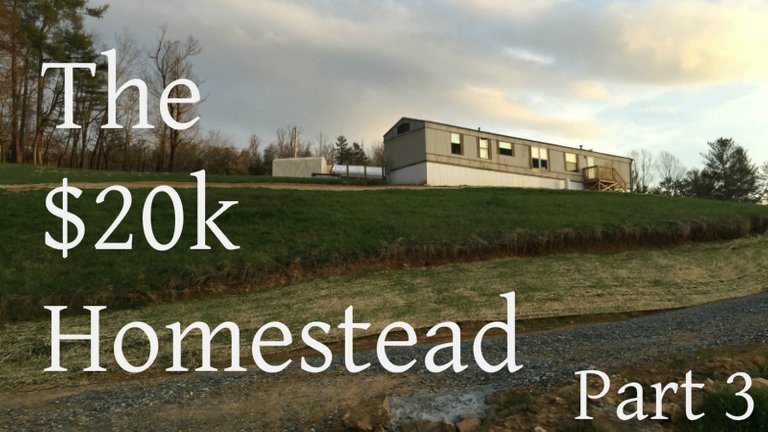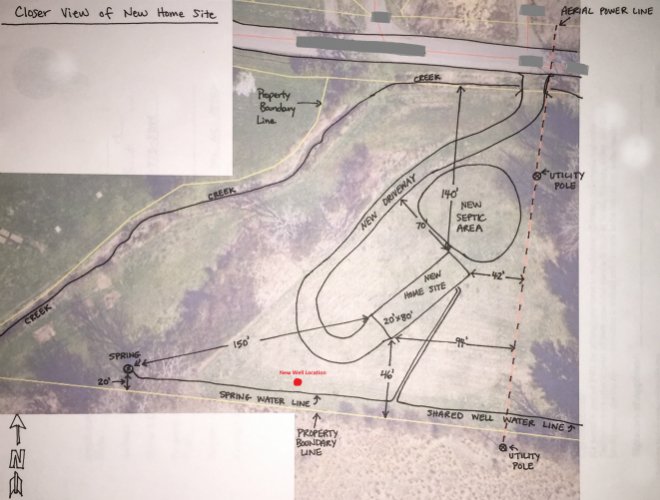
Welcome back to Part 3 of the $20k Homestead series! We're so glad you have chosen to join us again. Be sure to read Part 1 and Part 2 in case you missed them.
In this post, we're going to cover the legalities of building our home. While being very specific to our location, it is our hope that you will still find it informative, be able to glean something from it for your own project, or at least be entertaining.
ℹ️ Where to Start
The first place to start when planning to build is your local county planning department. Calling or browsing their website should get your ball rolling and help to learn what requirements are in your area. I had better luck understanding the requirements by calling, but your mileage may vary. Below is a quick list I created to keep me on track as I researched.
- Deed Restrictions - Any restrictions on the type of structure or land use (animals, farming)?
- County and/or City Building Requirements - What is the zoning for the land? Does it allow the type structure you plan to build? Some counties will have separate codes and requirements for traditional homes vs. manufactured homes.
- Permits - What permits are required for building? Common permits are: septic, water, building, electrical, plumbing.
💰Money Savings💰
Ask what items are allowed to be completed by the builder (you). In our county, they did not require any plumbing-connect permits and allowed me to connect our home to our well and septic system myself. Had I not asked, I would have hired a plumber to do this for me under the assumption it was required!
In our case, we were subject to the following permits from our county:
- Septic Permit & Soil Test - local health department
- Well Permit - local health department
- Building Permit - county building and permit office
💩 Septic Permit - $250
Our local Health Department - Environmental Health Division handles septic permits, inspections, and soil testing (also known as a perk test). We downloaded their form for new construction and completed all steps including mapping out the property and drawing where we intended to place items such as: home, driveway, well, power lines. In addition, we had to identify distances from the house to the property lines, well, and all water sources (creeks and springs).

Our site plan. Note the red dot where we ended up drilling our own well. Plans to share a well with another home on the property did not pan out (logistics of running the lines).
🌱 Soil Test - $0*
With our site plan completed, the next step was to dig the pits for our Soil Test. Our county allowed the pits to be dug by the owner instead of hiring a company. I rented a backhoe for a few hundred bucks and had fun!
The pits had to be 4' wide, 4' deep, and 4' long, and spaced at least 50' apart from each other. A few days later, and we had our permit with septic system planned by the inspector!
*The soil test fees were included in the $250 Septic Permit fee.
💰Money Savings💰
Even paying the $250 rental fee for the backhoe, we saved $350 by doing it ourselves! The lowest quote from a contractor was $600!
💦 Well Permit - $315
Our initial goal was to piggyback onto the well of another home on the property. We planned out the route for the water line and rented a trencher from the local hardware store for $150. Unfortunately, we hid solid rock about 8" down where the line was go travel through a flat section of the property. There was no other route, so we had to abandon the idea of sharing the well. A call to the Health Department and a check for $315 got us another visit from and inspector and a piece of paper saying we were okay to drill a well.
🚧 Building Permit - $250
Thankfully, our county only required one (more) permit for the building of our home. This permit included the authorization to place the home, any edits needed for zoning adjustments, and final inspection and issuing of the Certificate of Occupancy when the home was finished. The application packet for the building permit required all serial and title numbers on the home, and listings of all contractors or sub-contractors on the project: moving company, electricians, plumbers, etc.
📨 Coming Next...
With our legal boxes checked, we were clear to begin building! Coming up next... grading! Stay tuned and Follow us @greenacrehome to see our next chapter in this journey!
Thank you so much for following, reading, upvoting, and commenting. We read each and every comment and appreciate you all! Hopefully we are inspiring others by our journey.

Good info! Is there a time limit on the permits?
That's a great question!
Wow! I just found your post under #new and your life looks soooo interesting! It must be crazy!
Awesome! Thank again for all the great info. I have not checked on these yet but I like having an idea of what it could be. How much did the well and septic cost? Thanks!
Hmmmm... I should make you wait for those articles to come out... 😏 But I'll tell ya... So long as you promise to read them and upvote if they're good articles. 😁 Septic: $3,500, Well $6,000
WOW, I never thought it was that much. Septic yes but not the well. I appreciate all the info. It really helps with planning.
Seriously! We had a little sticker shock too. Your cost may vary depending on your location, soil type, and distance to underground water sources. But a call to a local contractor should get you a good ballpark. Most septic guys here just wanted to know what size (2 bedroom, 3 bedroom, etc.). Well costs are different because it's by the foot. Ours is right at 300' deep.